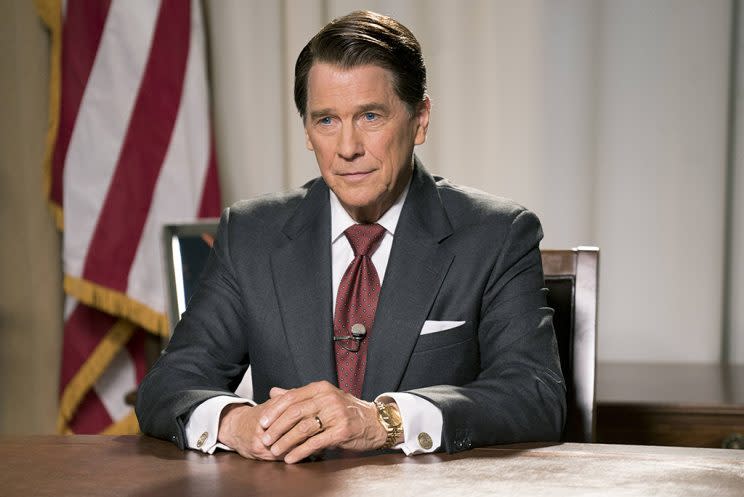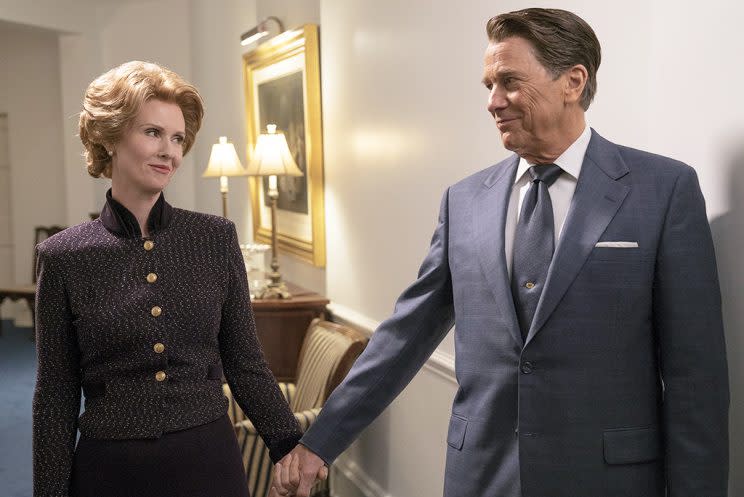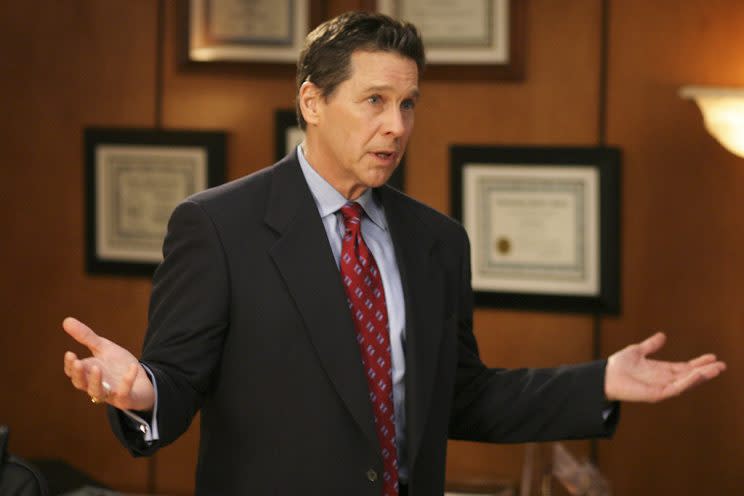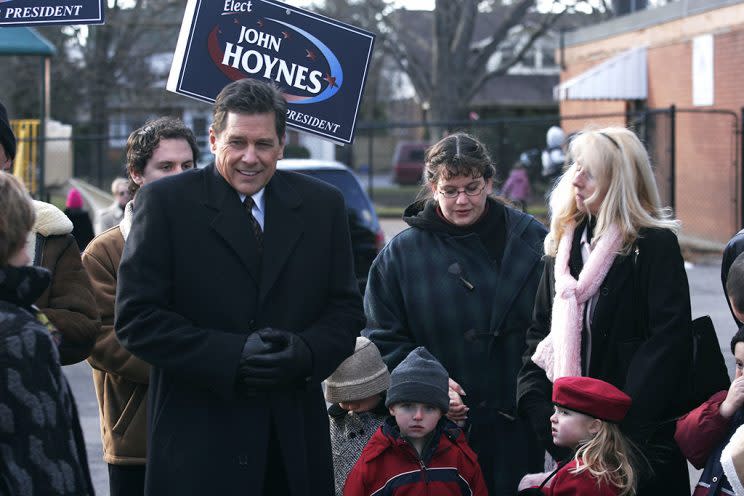‘Killing Reagan’ Star Tim Matheson Talks Finding New Respect for Reagan, and Acting Semicolons on ‘The West Wing’

From rush chairman to vice president to POTUS… Animal House star Tim Matheson gets presidential this week in National Geographic Channel’s Killing Reagan, the movie based on Bill O’Reilly’s (yes, that Bill O’Reilly) bestselling book about John Hinckley’s 1981 assassination attempt against President Ronald Reagan.
Matheson, who earned two Emmy nominations for playing the vice president on The West Wing, tells Yahoo TV he not only learned a lot about the 40th commander in chief while filming the movie, but developed a new respect for Reagan, too.
“When he was shot and first arrived at the hospital, he kept going in and out of consciousness. He was on the gurney, and a nurse was holding his hand,” Matheson says. “He looked up at her and said, ‘Does Nancy know about us?’ He was always kidding with people and trying to make them feel comfortable with him. That was sort of the key to it all. He could have been a stand up. He really loved telling jokes and getting people to laugh. That was his way of getting people disarmed. With Congress, it worked probably more often than it didn’t. He had a way of knocking down people’s resistance and walls.”
Related: Ken Tucker Reviews ‘Killing Reagan’: A Civilized TV Take on Bill O’Reilly’s Book
The actor and prolific TV director, who will extend his TV politics career when he plays an aspiring senator in FX’s much anticipated John Singleton drama Snowfall, about the early days of the crack cocaine epidemic in 1980s Los Angeles, also talked to Yahoo TV about Reagan’s presidential fitness, why he thinks Killing Reagan might especially resonate with viewers in these rocky political times, the reasons why Reagan referred to wife Nancy as “Mommy,” and just how wonderful — and precise — it was to say Aaron Sorkin’s words on The West Wing.
While preparing for the role and filming the movie, did you come to like or respect Ronald Reagan in ways that maybe you hadn’t before?
That’s a very interesting question. Yes. I was not politically affiliated with Reagan and what he represented, but coming away from it, I was enlightened and ennobled I think, because often times I tend to make the mistake of judging people by their politics, and say, “If they believe that, then this is what they’re about and this is the way they are.” I found that totally not true with him. That he was a very spiritual man. He was a very shy and humble man, and put the country before himself, which I think was one of the reasons why he was so effective as a president and why it was so important for him to be president at the time he was. He was the right guy in the right place at the right time.
I learned a lot. I think it helped me realize that in this time of tremendous disparity between the parties… I realized that really the job is to find a way to solve the problems of the people by working together with the other side and getting as much as you can get done. It’s not to stop anybody. It’s not to make somebody a one-term president. It’s not to score points. It’s really to do the work of the people and to try and figure out a way to get that work done. That’s something he was very adept at. One of his great quotes was, “There’s no limit to what a man can do, or where he can go, if he doesn’t mind who gets the credit.” I don’t know very many people who are thinking or living like that right now.

It’s a great scene in Killing Reagan when he puts the plaque with that quote on his desk in the Oval Office, especially when we see the maneuvering Alexander Haig tries to do after Reagan is shot.
Isn’t it? It really taught me a lot. About him, about life in general and about politics especially. I think it’s a classic sort of comparison between him and Haig. I think as you point out, there was a man that was all about ego, and then there was a man who was not all about ego, who was, as an actor… he had the humility that comes with being a B-actor. He wasn’t Humphrey Bogart or Clark Gable or Gary Cooper. He was Ronald Reagan, who’d been in a couple of good movies. He’d done pretty good in a couple of fairly good movies, but that was it. When he was around people, he tried to make them feel comfortable, to not treat him differently because he was an actor or a movie star. He did the same as president, and I think that’s why people loved him and were devoted to him. It was a reflection of the fact that he didn’t place himself above the job, the people, the country, or anything. It was job, country, first. Nancy second. Ronnie was down the line.
When playing a president, and particularly a more recent one, there’s no lack of research material, documents, videos available. That’s obviously beneficial, but do you also have to kind of step away from that at a certain point, to shape the character that you want to portray, or certain aspects of him that you want to portray?
Absolutely. Good point. You don’t get bonus points for sounding exactly like him, or moving exactly like him, you know? It’s really sort of a hint, a recreation of the inner man, is what my job was. That’s where I started from. I want to make sure the viewers go, “OK, that sounds enough like him. That looks enough like him, and that’s all great, but what was he thinking? What was going on there?” That was what we all tried to get at, and focus on. The rest is important, but that wasn’t our primary goal. That’s a terrible trap you can get into as an actor.
You do sound like him and look like him in the movie, but not in a caricature kind of way.
That’s great. If so, then I think we did our job, and I’m glad that came across. That was really what we were trying to do. It was [about[ the man and the woman. It was a love story about Ronnie and Nancy. It just happened to coincide with a murder attempt by this very seriously ill man, mentally ill man, who had lost his way. The thing that moved me the most about Reagan was that after he was shot, while he was in the hospital, and we do it in the movie, he said, “I have to forgive [John Hinckley]. I’m going to pray for him.” I was just flabbergasted and taken aback, because, it was like, “Who’s thinking that?” He seriously, seriously meant it, that he couldn’t go on with his life, unless he took care of this, his feelings about this man who tried to kill him. He found a new purpose and direction in his life after that happened. He redoubled his efforts to make peace with the Soviets, and created a nuclear disarmament.
There is such a focus this year, with the particularly polarizing political climate, on the behaviors that make someone “presidential” or not, and a takeaway from Killing Reagan, whatever your political leanings are, is that he was a dignified man. His comportment would not have embarrassed anyone. Do you think the movie will resonate a little bit extra with viewers?
I hope so. I think it would be something to throw into the mill, as grist. You can take a look at a man that they said wasn’t … “He’s an actor, what does he know?” But he’d been a governor for eight years, he’d been head of the Screen Actors Guild for nearly six years, during its most difficult times. He was a skilled negotiator, contract negotiator, and had very firm principles. He was an elder statesman. You see the depth of knowledge, commitment, and capabilities, and how seriously he took it. He never went into the Oval Office without his suit on and jacket on, and a tie, and never let anyone else enter there without them, just out of respect, and a sense of decorum, because of how seriously he took [the office] and how much he loved this country and honored this country. I think those are important attributes that we should look for in our elected officials, and find ones with the experience that speak to that kind of a challenge. Whoever takes that job on, there’s going to be those moments that occur that you can’t plan for and you have to be measured, thoughtful, strong, resilient, and focused. If a candidate lacks any of those attributes, I don’t think they’re qualified.

The Reagans’ love story also hasn’t lacked commentary, with the main criticism usually that they were so focused on each other that, and they admitted this, they weren’t maybe the parents they wanted to be because of that. Did anything you learned about their relationship surprise you?
The depth to which she was committed to supporting him, helping him achieve his dreams and his goals, was greater than I had imagined. I had always remembered the cliché about Nancy, “Oh, she was tough!” A lot of times, powerful men’s spouses, or powerful women’s spouses, can be that way. They seem to confuse themselves with the [spouse], and they get demanding, or they get prickly or temperamental. I sort of imagined Nancy in that vein. Then the more I read about her, I realized that it only had to do with him … she wanted everything to be right for him, and to protect him. Everything she did was to create that. He was 70 when he took office. When he got into the Oval Office, he liked to put in a full day, start at 8 (a.m.), end at six. Then he’d go home, and if he didn’t have anything to do in the evening, he would take a shower, get into his pajamas, and he would sit in his robe, she was in her pajamas and her robe, and they’d watch a movie, they’d have dinner, they’d read. He’d do some homework, write a speech or whatever. But it was the two of them. It was their time. That was news to me, that he was a very simple man, a shy person. She was his constant and kept him focused and relaxed and on track. He had it no other way.
I love the line in the movie when he’s preparing to go on stage in Cleveland for the debate against Jimmy Carter, and tells her, “I think you’re more nervous than I am.” She said, “That’s as it should be.” She thought it was her job to take on stresses for him sometimes.
Yeah, that’s true. It’s like parents, you watch your kid up there on stage… and it’s worse, because you can’t do anything! You hope you’ve done everything right to get them to this point. In a funny way, [Reagan] called [Nancy] “Mommy.” We think about that in kind of like an “Oops!” kind of way. It was one of those terms of endearment, because she so wanted to be a mother. She’d had a couple of miscarriages before she had Patty, and she just didn’t know if she was ever going to have a child. Then she did, and then she had Ronnie Jr. The term “Mommy” was a special term between them to honor the fact that she was, in fact, a mother. It comes from a different place. It was the nature of their relationship. She mothered him tremendously.

This is not your first time at the TV White House rodeo; you earned a pair of Emmy nominations for playing Vice President John Hoynes The West Wing. Is there a different kind of mindset you have to get into for preparing to play a president versus a vice president?
Totally. Vice president is the bridesmaid, and nobody cares about you. Nobody wants you. You’re just in the way. You’re there to play a subsidiary role. You’re like the middle child or the poor relation. It’s like, “Yeah, yeah, yeah. Get out of the way.” When you’re the president, there’s tremendous respect, and everybody goes out of their way respecting you and honoring you… it can be a trap. Nobody says “Boo” to you, and nobody tells you you’re wrong, hardly, if you have the wrong people around you. I think Reagan always had the right people around him telling the truth, and that would, if he needed, suggest a course adjustment. [Reagan] had a bad debate against Mondale in [1984], but came back really strong in his second debate. He was not above making adjustments and acknowledging his mistakes. Yeah, the role of the vice president is nothing compared to the president. You’re just sort of in the way and (expected to) shut the heck up.
What was the most fun thing about playing Hoynes?
Just to be on the set with that group of fantastic, skilled actors. John Spencer, who I deeply loved and admired, and Allison Janney, Brad Whitford, and Martin Sheen, Richard Schiff and Rob Lowe and all those wonderful people, and writing by Aaron Sorkin and directing by Tommy Schlamme. Especially the work that Aaron did was just exceptional. It was one of those things, not unlike Animal House, where every character was perfect. Every line was just the best it could be. The direction was the best it could be. That was The West Wing, too, for those first four years especially. It was just an exceptional experience and remarkable fun. Although very difficult work. Very challenging. To do that, you had to say … I remember a time where a script supervisor came up to me and said, “That is a semi-colon, not a period.” Aaron wanted it the way it was written. Exactly! You would do a scene over again if it wasn’t, if you didn’t say every word as written.

Do you have extra respect for that as an experienced TV director?
Totally. Totally. Because a lot of actors, “Eh, it’s close enough. Eh.” They don’t do the work. They don’t learn the lines. You can’t play the part if you don’t learn the lines and honor the writer. The writer’s spent a long time getting things exactly the way they needed them to be, and it’s not up to the actors to rewrite them.
You also played JFK in the 2000 CBS TV movie Jackie Bouvier Kennedy Onassis, another very charismatic man, president, but also a very different marriage than the Reagans. How was that different, preparing to play Kennedy, versus Reagan?
It was interesting. I think I focused more on the accent and more on the sound. The script wasn’t so much about he and Jackie. It just didn’t feel as intimate and as personal as [Killing Reagan], and I think that I would have been better served to focus more on the internal, rather than the external. I learned a great deal from that. I loved working with Joanne Whalley. She was just the most fun partner to work with, I must say. We had a great time. But it was a different kind of a story. That’s the thing about Bill O’Reilly that I think is so smart. It’s so interesting the way O’Reilly has done it with these stories … you’re getting a tense mystery, and you’re getting this tremendous insight into history, without getting a history lesson. You’ve got your cake, and you can eat it too. It’s dramatically really smart, because, if you do a movie about John Hinckley, you look at it and you go, “Well, it’s not Taxi Driver.” If you look at a movie about Reagan, you go, “Well, OK, it’s not All the President’s Men. It’s OK, but it’s too much politics.” Or whatever. Here, you’ve got the best of both worlds. You’ve got the Reagan story and the Hinckley story, and I think they serve each other well, and create a tremendous amount of tension and mystery and great drama. All the stories are wonderful ways into the other stories.
Killing Reagan airs Oct. 16 at 8 p.m. on National Geographic Channel.

